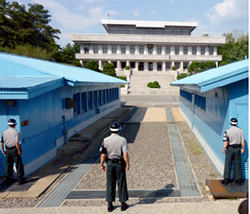| Search PNC News for stories of people and churches in our UCC Conference: |
|---|
Space still available in May visit to South Korea
Space is still available for people to join the delegation for the exchange visit to church partners in Seoul, South Korea, said Ed Evans, convenor of the Global Ministries Committee of the Pacific Northwest UCC and Northwest Region Disciples of Christ.
 |
The DMZ - Demilitarized Zone - on the South Korea-North Korea border is one of the sites the delegaAtion will visit. Photo courtesy of Ed Evans |
Delegates, who will travel to South Korea May 16 to 23, will be visiting the DMZ demilitarized zone in Panmunjom, which separates North and South Korea. The Joint Security Area in the middle of the DMZ is where negotiations between the two Korean nations take place, said Ed.
“The Panmunjom Peace Village in the DMZ is the only place where South and North Korea can hold talks,” he said. “A trip to the disputed zone helps visitors come to a greater understanding of the reality of the divided Korean Peninsula.”
The Pacific Northwest Conference of the UCC and the Northwest Region of the Christian Church (Disciples of Christ) have had a partnership since 1993 with the Seoul East Presbytery of the PROK, the Presbyterian Church of the Republic of Korea.
“A priority of the PROK is the reunification of the two Koreas,” said Ed.
The PROK was created in 1953, after breaking away from the larger Presbyterian Church of Korea (PCK) over conservative and progressive theological differences. The PROK became the first denomination in Korea to ordain women into the ministry in 1956, he said.
The delegation will also be visiting the House of Sharing, a nursing home where surviving World War II Japanese soldier sexual slaves, known as comfort women, continue to live.
“South Korea and Japan foreign ministers recently reached a breakthrough settlement that includes a written apology from Japanese Prime Minister Shinzo Abe and a pledge by Tokyo to provide $8.9 million for Seoul to establish a foundation to support the surviving women,” Ed said.
According to the Internet news site for the Voice of America, voanews.com, the settlement also asks South Korea to remove a “comfort women” statue located across from the Japanese Embassy in Seoul. Supporters have held a weekly protest rally for years at the site demanding an official Japanese apology and restitution. Only 44 comfort women survivors remain in South Korea, of the 238 who came forward. Their average age is 89.
The delegation will also join in another peace action, expressing solidarity with the Gangjeong Peace Village.In 2012, the Global Ministries Committee of the region voted to support the people of Gangjeong Village of Jeju Island off the southern tip of South Korea.
In 2007, South Korea said they intended to build a Navy base at Gangjeong Village to accommodate both Korean and U.S. Navy ships. A 15-foot high wall was built to keep villagers away from the proposed base, but the people protest it.
“Since that time they have been engaged in a campaign of daily nonviolent resistance and have been joined by religious leaders, priests, nuns and various church organizations including the National Council of Churches of Korea (NCCK), the Presbyterian Church in the Republic of Korea (PROK) and the Christian Conference of Asia (CCA),” Ed said.
A letter of solidarity was sent by the Global Ministries Committee of the Pacific Northwest UCC Conference to “encourage the passion and courage of the people to resist outside forces of destruction.”
The villagers have been engaged in a nonviolent resistance campaign against construction of the Navy base at the island that would accommodate up to 20 warships, including submarines and U.S. Aegis destroyers armed with cruise missiles.
“South Korea says the ships based on Jeju Island will protect shipping lanes for South Korea’s economy, which depends on imported oil. It will also enable South Korea to respond quickly to a territorial dispute with China over Socotra Rock, a submerged reef south of Jeju that Koreans called Ieodo. American ships cruising to East Asia will also be permitted to visit the port,” Ed reported.
According to the National Catholic Reporter, many villagers have been arrested, imprisoned and had land and civil rights taken from them during their resistance, staging sit-ins and using their bodies to block construction equipment. The long running protests of Gangjeong Village can be followed on the Facebook page, “No Naval Base on Jeju!”
For information, call 360-670-1073 or email edevans@aol.com.
Copyright April 2016 - Pacific NW United Church News
